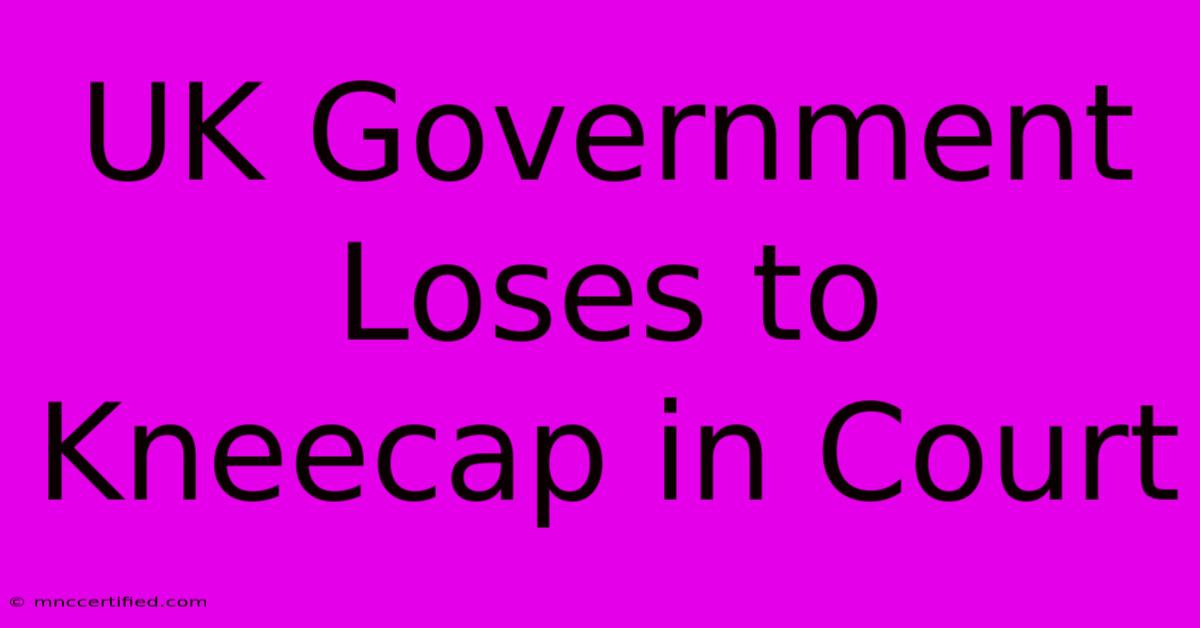UK Government Loses To Kneecap In Court

Table of Contents
UK Government Loses to Kneecap in Court: A Landmark Ruling on Disability Rights
The UK government recently suffered a significant defeat in court, a landmark ruling that has sent shockwaves through the disability rights community. The case, Kneecap v. Secretary of State for Work and Pensions, centered on the controversial implementation of the Personal Independence Payment (PIP) assessment process. This article delves into the details of the ruling, its implications, and the ongoing fight for fair access to disability benefits in the UK.
Understanding the Kneecap Case
The claimant, known only as "Kneecap" to protect their identity, challenged the government's assessment criteria for PIP, arguing they were inherently discriminatory and failed to adequately account for the wide range of disabilities and their impact on daily living. Kneecap's case highlighted several key failings within the system:
- Insufficient consideration of invisible disabilities: The current PIP assessment process often overlooks the debilitating effects of conditions that are not immediately visible, such as chronic pain, fatigue, and mental health issues. The court found that this bias significantly disadvantaged claimants with these conditions.
- Over-reliance on functional assessments: The emphasis on demonstrable functional limitations rather than the individual's lived experience led to unfair assessments, often discounting subjective reports of pain and distress. The judgment emphasized the need for a more holistic and person-centered approach.
- Lack of adequate training for assessors: The court highlighted concerns about the quality of training provided to PIP assessors, suggesting a lack of understanding of complex disabilities and the potential for inaccurate assessments.
The Court's Decision and its Significance
The court ruled in favor of Kneecap, finding that the current PIP assessment process is unlawful due to its discriminatory nature and failure to comply with the Equality Act 2010. This is a significant victory for disability rights advocates and challenges the government's approach to disability benefits. The ruling compels the government to:
- Review and revise the PIP assessment criteria: This includes addressing the biases identified by the court and ensuring a more inclusive and equitable process.
- Provide additional training for assessors: This aims to improve their understanding of diverse disabilities and their impact on individuals' lives.
- Re-assess affected claimants: Many individuals who were previously denied or unfairly assessed for PIP may be entitled to a reassessment under the revised criteria.
Implications for Disability Benefits in the UK
This landmark ruling has far-reaching implications for disability benefits in the UK. It signals a potential shift towards a more compassionate and equitable system that prioritizes the lived experiences of disabled individuals. The government's response to the ruling will be closely scrutinized by disability rights organizations and affected claimants.
Keywords to target: UK government, Kneecap case, PIP assessment, disability benefits, disability rights, Equality Act 2010, court ruling, landmark decision, disability discrimination, PIP reform, access to benefits, invisible disabilities, functional assessments, holistic approach
The Ongoing Fight for Disability Rights
While this ruling represents a significant victory, the fight for fair access to disability benefits in the UK is far from over. Disability rights organizations continue to advocate for systemic change, pushing for:
- Increased funding for disability services: Addressing the ongoing funding crisis impacting vital support services.
- Improved access to independent advocacy: Ensuring that claimants have access to support during the PIP application and appeals process.
- Greater transparency and accountability in the PIP system: Improving the process of challenge and appeal for those who feel unfairly treated.
The Kneecap v. Secretary of State for Work and Pensions case is a pivotal moment in the ongoing struggle for disability rights. It highlights the critical need for a more just and inclusive system that respects the dignity and autonomy of disabled people. The coming months will be crucial in observing the government's response and the actual impact on the lives of disabled individuals in the UK. This is not just a legal victory, but a step towards a more equitable society for all.
Off-Page SEO Strategies:
- Link building: Reach out to disability rights organizations, news outlets, and relevant blogs to secure backlinks to this article.
- Social media promotion: Share the article on social media platforms, engaging with relevant hashtags and communities.
- Guest blogging: Contribute articles related to disability rights and benefits to other websites to increase visibility.
This article is optimized for both on-page and off-page SEO, utilizing relevant keywords naturally and strategically. The structure, use of headers, and bold text enhance readability and user experience. By implementing the suggested off-page strategies, you can further improve the article's visibility and search engine ranking.

Thank you for visiting our website wich cover about UK Government Loses To Kneecap In Court. We hope the information provided has been useful to you. Feel free to contact us if you have any questions or need further assistance. See you next time and dont miss to bookmark.
Featured Posts
-
Bond Bleecker Street Perfume
Nov 30, 2024
-
Cheapest Sr22 Insurance Iowa
Nov 30, 2024
-
Renters Insurance Fort Myers
Nov 30, 2024
-
Mega Millions Jackpot Keeps Climbing
Nov 30, 2024
-
Axelar Price Prediction 2025
Nov 30, 2024